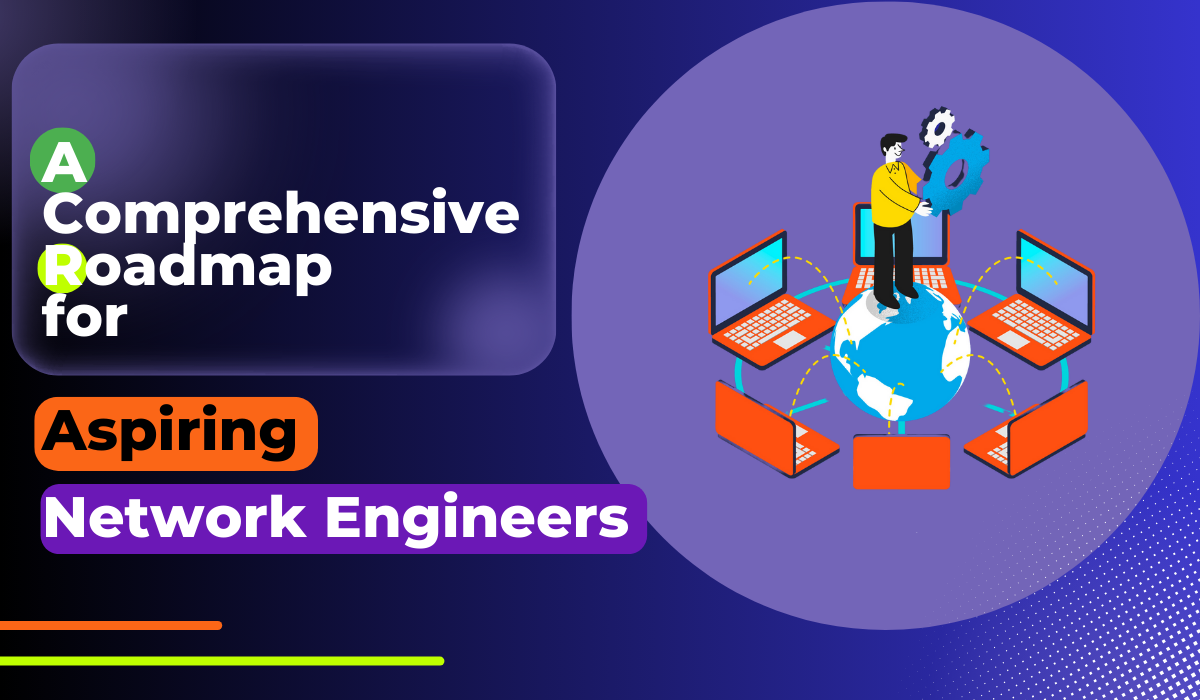Are you fascinated by the intricate web of connections that make the internet function seamlessly? Do you dream of a career where you play a pivotal role in ensuring data flows smoothly across the digital landscape? If your answer is yes, then you are on the right path to becoming a network engineer. In this comprehensive guide, we will provide you with a roadmap for network engineer, shedding light on the scope of CCNA (Cisco Certified Network Associate) and other essential aspects of this rewarding career.
Introduction
Network engineers are the unsung heroes behind our interconnected world. They design, implement, and manage the networks that allow us to communicate, work, and play online. This article will serve as your comprehensive roadmap to becoming a successful network engineer, starting from the basics and leading you through advanced certifications like CCNA.
Understanding the Role of a Network Engineer
Before diving into the technical aspects, it’s essential to grasp the role of a network engineer. They are responsible for maintaining the infrastructure that enables data transmission between devices. This includes ensuring network security, optimizing performance, and troubleshooting connectivity issues.
Importance of a Roadmap
Having a roadmap in any endeavor is crucial, and a career in network engineering is no exception. It provides you with direction, milestones, and a clear path to follow. Let’s start by laying the foundation.
Foundations: Building Your Networking Knowledge
- Networking Fundamentals
Begin by understanding the core concepts of networking. Learn about data transmission, network topologies, and the basics of how data flows in a network. Networking fundamentals are the building blocks upon which your entire career will rest.
- Understanding Protocols
Dive deeper into networking protocols such as TCP/IP and HTTP. Comprehending these protocols is fundamental to becoming a proficient network engineer. Protocols govern how data moves across networks, and understanding them is key to diagnosing and solving network issues.
- OSI Model Demystified
The OSI (Open Systems Interconnection) model is a framework that defines networking functions. Understanding its seven layers is crucial to troubleshooting network issues effectively. Each layer has specific responsibilities, and knowing how they interact will help you pinpoint and resolve problems more efficiently.
Getting Started with CCNA
What is CCNA?
CCNA, which stands for Cisco Certified Network Associate, is a globally recognized certification that validates your knowledge of networking fundamentals. It is a significant stepping stone for aspiring network engineers. CCNA covers a wide range of topics, including network fundamentals, network access, IP connectivity, IP services, security fundamentals, and automation and programmability.
Scope and Importance
The scope of CCNA is vast. It covers various networking topics, including routing and switching, network security, and troubleshooting. Earning this certification enhances your credibility and opens doors to networking opportunities. Whether you aspire to work as a network administrator, a network support engineer, or in network security, CCNA certification is an asset.
Preparing for the CCNA Certification
- Study Materials and Resources
To prepare for the CCNA exam, gather study materials such as textbooks, online courses, and practice tests. Cisco’s official website offers valuable resources, including study guides and practice exams. Many other online platforms provide CCNA training materials and practice questions.
- Hands-on Practice
Hands-on experience is invaluable. Set up a home lab to practice configuring routers, switches, and firewalls. Practical knowledge is essential for passing the CCNA exam and succeeding as a network engineer. You can simulate real-world scenarios in your lab environment, allowing you to troubleshoot problems and gain confidence in your abilities.
Diving Deeper: Advanced Networking Concepts
- Routing and Switching
Gain expertise in routing protocols like OSPF and BGP. Understand how switches operate and how they can optimize network traffic. Routing and switching are foundational to network engineering, and proficiency in these areas is highly sought after in the job market.
- Security and Firewall Configuration
Network security is paramount in today’s digital landscape. Learn to configure firewalls, VPNs, and intrusion detection systems to safeguard data and protect networks from cyber threats. A strong focus on security will make you a more valuable network engineer.
- Network Troubleshooting
Troubleshooting is a significant part of a network engineer’s job. Develop the skills to diagnose and resolve connectivity issues efficiently. Effective troubleshooting can minimize downtime and keep networks running smoothly.
Gaining Practical Experience
Internships and Entry-Level Positions
Start your career by seeking internships or entry-level positions in IT departments or network-related companies. Practical exposure is invaluable, and these opportunities will allow you to apply your knowledge in real-world scenarios. Consider roles like network technician or junior network administrator to get your foot in the door.
- Building a Home Lab
Create a home lab with networking equipment to experiment and gain hands-on experience. It’s a cost-effective way to enhance your skills and test network configurations without impacting production environments. A home lab can be a powerful tool for learning and practicing.
Certifications Beyond CCNA
- CCNP (Cisco Certified Network Professional)
Consider pursuing CCNP for advanced networking expertise. CCNP covers topics like advanced routing, network infrastructure, wireless networking, and network automation. It is an excellent option for network engineers looking to take their careers to the next level.
- CompTIA Network+
The CompTIA Network+ certification is another valuable credential that broadens your networking knowledge and job prospects. It is vendor-neutral and covers a wide range of networking topics, making it a versatile choice for aspiring network engineers.
Networking in the Real World
- Industry Trends
Stay updated with the latest networking trends, such as the adoption of IPv6, SD-WAN (Software-Defined Wide Area Network), and cloud networking. Continuously learning and adapting to new technologies is essential in this field. Networking is an ever-evolving field, and staying informed about industry trends will keep you ahead of the curve.
- Staying Updated
Network technology evolves rapidly. Subscribe to industry publications, join forums, and attend seminars or webinars to stay current with networking advancements. Networking communities and online resources can help you stay informed and connect with professionals in the field.
Soft Skills for Network Engineers
- Communication Skills
Effective communication is crucial when working in teams and explaining technical issues to non-technical stakeholders. As a network engineer, you’ll often collaborate with colleagues and convey complex technical concepts to clients or management.
- Problem-Solving Abilities
Network engineers often face complex problems. Sharpen your problem-solving skills to tackle challenges effectively. The ability to think critically and find innovative solutions is highly valued in this profession.
Building a Network Engineer’s Resume
Highlight your certifications, practical experience, and technical skills on your resume. Tailor it to showcase your qualifications for network engineering roles. Mention any projects, internships, or lab work that demonstrates your hands-on experience and expertise.
Job Search and Interview Tips
Prepare for interviews by researching the company, practicing common interview questions, and demonstrating your passion for networking. Showcase your problem-solving abilities, communication skills, and technical knowledge during interviews. Networking professionals who can effectively convey their expertise and adapt to real-world scenarios are highly sought after.
FAQs – frequently asked question
What is the scope of CCNA in the job market?
CCNA certification opens doors to various roles, including network administrator, support engineer, and security specialist. It is recognized globally and is a valuable credential for network professionals.
How can I gain practical experience as a network engineer?
Seek internships, entry-level positions, or set up a home lab to gain hands-on experience. Participating in real-world projects and troubleshooting network issues will enhance your practical skills.
What are some essential soft skills for network engineers?
Effective communication, problem-solving, and teamwork are crucial soft skills for network engineers. Being able to collaborate with colleagues, explain technical concepts clearly, and adapt to diverse working environments is essential.
Are there networking trends I should be aware of as a network engineer?
Yes, staying updated with industry trends is essential. Key trends include the transition to IPv6, the implementation of SD-WAN solutions, and the increasing importance of cloud networking. Continual learning and adaptation are vital in this field.
Conclusion
Becoming a network engineer is a rewarding journey that offers exciting challenges and opportunities. By following this roadmap, you can build a solid foundation, earn certifications like CCNA, and excel in this dynamic field. Network engineers play a crucial role in today’s digital world, and your skills will be in high demand as businesses and organizations continue to rely on robust and secure networks.













